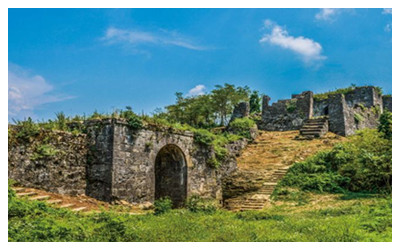
Hailongtun Tusi Fortress Site
 Hailongtun Tusi Fortress is located in Gaoping Town, Huichuan District, Zunyi City of Guizhou Province. the Site of Hailongtun Tusi Fortress is an essential relic of the Tusi Culture in southwest China. It covers a total area of 5 12.9 square kilometers, with an altitude of 1,324 meters above the sea level. It is the only site in Guizhou that combines large-scale military buildings with palaces in Guizhou. It is also one of the best-preserved ancient fortresses in China. Nowadays, both the military fortresses and royal palaces are gone due to the passage of time. Only the sites of ancient paths, city walls, passes, and government offices still remain. In 2001, the site was listed as a key historical and cultural relic under state protection. On July 4, 2015, it was listed as a UNESCO World Cultural Heritage Site together with the Site of Tangya Tusi Domain in Hubei and the Site of Laosicheng Tusi Domain in Hunan at the 39th World Heritage Convention.
Hailongtun Tusi Fortress is located in Gaoping Town, Huichuan District, Zunyi City of Guizhou Province. the Site of Hailongtun Tusi Fortress is an essential relic of the Tusi Culture in southwest China. It covers a total area of 5 12.9 square kilometers, with an altitude of 1,324 meters above the sea level. It is the only site in Guizhou that combines large-scale military buildings with palaces in Guizhou. It is also one of the best-preserved ancient fortresses in China. Nowadays, both the military fortresses and royal palaces are gone due to the passage of time. Only the sites of ancient paths, city walls, passes, and government offices still remain. In 2001, the site was listed as a key historical and cultural relic under state protection. On July 4, 2015, it was listed as a UNESCO World Cultural Heritage Site together with the Site of Tangya Tusi Domain in Hubei and the Site of Laosicheng Tusi Domain in Hunan at the 39th World Heritage Convention. History
The Tusi System was a hereditary political system in southwest China. The supreme governor was called Tusi or the Chieftain. The Hailongtun Tusi was established in 876 when the first chieftain Yang Duan occupied Bozhou (today's Zunyi). It lasted for 725 years over 29 generations. The fortress was first constructed by the local chieftain and the imperial government in 1257. However, the imperial government launched the Bozhou Campaign against the Tusi in 1600. 17,000 Tusi soldiers who were led by the 29th Chieftain Yang Yinglong fought against the 240,000 imperial soldiers for 114 days. In the end, the Tusi failed and Yang Yinglong was killed. The Ming imperial soldiers burned the buildings in the fortress down, and put an end to the rule of the Yang Family.
Military Defense System
The Hailongtun Tusi Fortress is located at the top of mountains and sandwiched by two streams on the left and right. The geographical location is pretty advantageous. Hence, the fortress was once a sound military defense castle. It was made up of 3 lines of defense, including 2 castles, 3 fortresses, and 16 passes. The first line of defense consisted of the Loushanguan Pass, Sanduguan Pass, Shangduguan, Pass, Laojunguan Pass, Wujiangguan Pass, Heduguan Pass, Huangtanguan Pass, Yamenguan Pass, and Luomengguan Pass. The line was the forward position which forced enemies to spread into battle formation. The second line of defense was comprised of the Horse Ranch, Chicken Farm, Haiyuntun Quarter, and Longzhuatun Quarter. They further protected the Hailuntun core area. The third line consisted of the Iron Pillar Pass, Bronze Pillar Pass, Flying Tiger Pass, Flying Dragon Pass, Chaotianguan Pass, Taipingguan Pass, Wan'anguan Pass, and city walls. As the core area of the military castle, the third line was the main battle field and the last barrier of Hailuntun.
What to see?
Major Relics
The existing relics in the Site of Hailongtun Tusi Fortress are comprised of the city walls, old passes, ancient buildings, halls, plank roads, drill grounds, ancient battlefields, sites of logistical support, and sites of construction materials.
Horse Ranch
With a gross area of 494 acres (200 hectares), the Horse Ranch is situated in the Hailongtun Village and the Daqiao Village. It was first constructed in the Tang Dynasty (618-907), and renovated in the Yuan Dynasty (1271-1368) and the Ming Dynasty (1368-1644). The existing wall is 6,124 yards (5,600 meters) long. The height of it ranges between 10 feet (3 meters) and 30 feet (9 meters). There are six gates in total, including the Small East Gate, the East Gate, the West Gate, the Zhangjia Gate, the Yue'er Gate, and the Tianjia Gate. This was listed as a historical and cultural relic under municipal protection by the government of Zunyi in December, 2003.
Relic of the Stone with Square Holes
The Relic of the Stone with Square Holes was found in Taiping Resident Group, Hailongtun Village. There are 32 square holes in the rock by the Baiyan River. The side lengths of these holes vary from 5.9 inches (0.15 meter) to 9.8 inches (0.25 meter), while their depths range from 5.9 inches (0.15 meter) to 7.9 inches (0.2 meter). The relic is associated with the water conservatory facility in the military defense system.
Relic of Three Round Hills
Located in Baisha Resident Group, Hailongtun Village, the Relic of Three Round Hills covers a total area of 49 acres (20 hectares). It is comprised of three hills of different sizes, and was the main battlefield of the Bozhou Campaign because it is the only flat area before the village.
Flying Tiger Pass
The Flying Tiger Pass is also known as the Suspension Bridge Pass, with an altitude of 3,281 feet (1,000 meters) above the sea level. In front of the pass is a steep stairway. It is made up of 36 stone stairs, with a total length of 56 yards (51.5 meters) and an incline of 30 degrees. Each step measures about 1.6 feet (0.5 meter) in height and 1.6 yards (1.5 meters) in width. It is exhausting to climb the steps normally, let alone during a battle! Tourists often gasp for breath when they arrive at the Flying Tiger Pass. This is quite challenging!
Travel Tips
Add: Gaoping Town, Huichuan District, Zunyi City of Guizhou Province.
Transport: Take a bus from Maocaopu Passenger Station to Gaoping with a fare of CNY 3 - 5. Upon Arrival, take a minibus to Hailongtun, costing CNY 5.
Entrance Fee: CNY 90
Opening Hours: 08:00-16:30
http://www.hailongtun.com/



 Ask Questions ?
Ask Questions ?